江苏省黄桥中学2009届高三英语语法专题复习
江苏高考高三英语语法知识复习
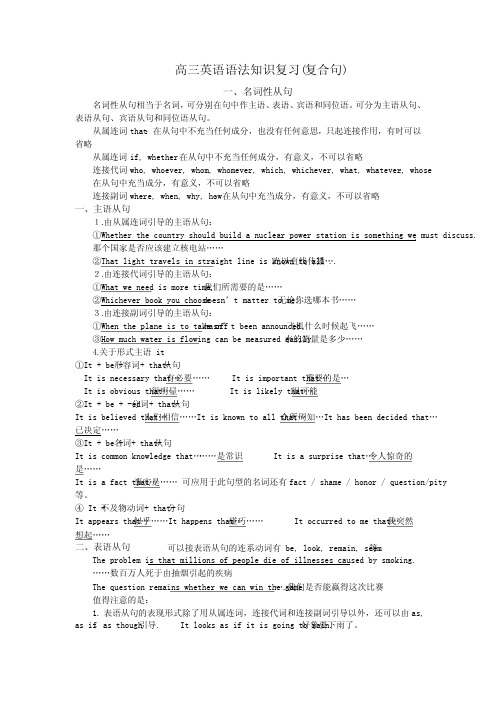
高三英语语法知识复习(复合句)一、名词性从句名词性从句相当于名词,可分别在句中作主语、表语、宾语和同位语。
可分为主语从句、表语从句、宾语从句和同位语从句。
从属连词that:在从句中不充当任何成分,也没有任何意思,只起连接作用,有时可以省略从属连词if, whether:在从句中不充当任何成分,有意义,不可以省略: 连接代词who, whoever, whom, whomever, which, whichever, what, whatever, whose在从句中充当成分,有意义,不可以省略连接副词where, when, why, how:在从句中充当成分,有意义,不可以省略一、主语从句1.由从属连词引导的主语从句:①Whether the country should build a nuclear power station is something we must discuss.那个国家是否应该建立核电站……光以直线传播….②That light travels in straight line is known to all .2.由连接代词引导的主语从句:我们所需要的是……①What we need is more time.无论你选哪本书……②Whichever book you choosedoesn’t matter to me.3.由连接副词引导的主语从句:飞机什么时候起飞……①When the plane is to take offhasn’t been announced.水的流量是多少……③How much water is flowing can be measured easily.4.关于形式主语 it①It + be +形容词+ that-从句重要的是…有必要…… It is important that…It is necessary that…很明显…… It is likely that….很可能It is obvious that…分词+ that-从句②It + be + -ed众所周知…It has been decided that…人们相信……It is known to all that…It is believed that…已决定……名词+ that-从句③It + be +It is common knowledge that… ……是常识 It is a surprise that…令人惊奇的是……事实是…… 可应用于此句型的名词还有fact / shame / honor / question/pityIt is a fact that…等。
江苏省黄桥中学高三英语语法复习第四章情态动词
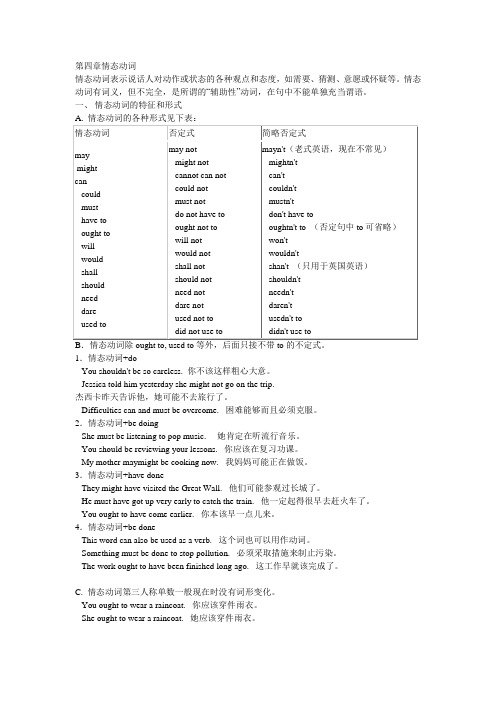
第四章情态动词情态动词表示说话人对动作或状态的各种观点和态度,如需要、猜测、意愿或怀疑等。
情态动词有词义,但不完全,是所谓的“辅助性”动词,在句中不能单独充当谓语。
一、情态动词的特征和形式B.情态动词除ought to, used to等外,后面只接不带to的不定式。
1.情态动词+doYou shouldn't be so careless. 你不该这样粗心大意。
Jessica told him yesterday she might not go on the trip.杰西卡昨天告诉他,她可能不去旅行了。
Difficulties can and must be overcome. 困难能够而且必须克服。
2.情态动词+be doingShe must be listening to pop music. 她肯定在听流行音乐。
You should be reviewing your lessons. 你应该在复习功课。
My mother maymight be cooking now. 我妈妈可能正在做饭。
3.情态动词+have doneThey might have visited the Great Wall. 他们可能参观过长城了。
He must have got up very early to catch the train. 他一定起得很早去赶火车了。
You ought to have come earlier. 你本该早一点儿来。
4.情态动词+be doneThis word can also be used as a verb. 这个词也可以用作动词。
Something must be done to stop pollution. 必须采取措施来制止污染。
The work ought to have been finished long ago. 这工作早就该完成了。
C. 情态动词第三人称单数一般现在时没有词形变化。
江苏省黄桥中学高三英语最后一个月复习计划
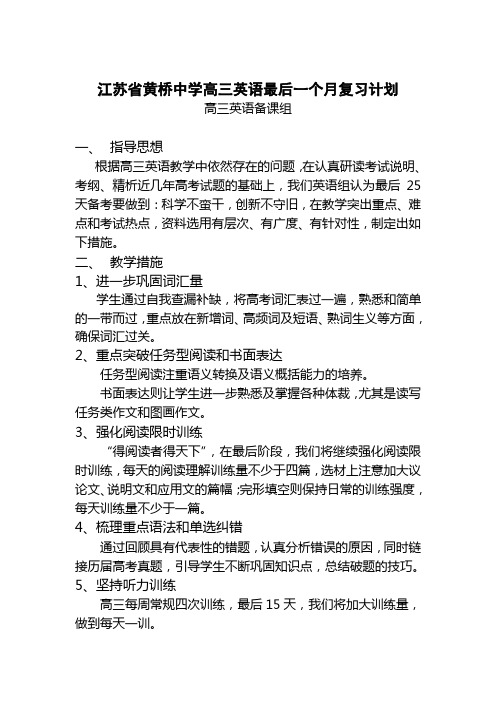
江苏省黄桥中学高三英语最后一个月复习计划
高三英语备课组
一、指导思想
根据高三英语教学中依然存在的问题,在认真研读考试说明、考纲、精析近几年高考试题的基础上,我们英语组认为最后25天备考要做到:科学不蛮干,创新不守旧,在教学突出重点、难点和考试热点,资料选用有层次、有广度、有针对性,制定出如下措施。
二、教学措施
1、进一步巩固词汇量
学生通过自我查漏补缺,将高考词汇表过一遍,熟悉和简单的一带而过,重点放在新增词、高频词及短语、熟词生义等方面,确保词汇过关。
2、重点突破任务型阅读和书面表达
任务型阅读注重语义转换及语义概括能力的培养。
书面表达则让学生进一步熟悉及掌握各种体裁,尤其是读写任务类作文和图画作文。
3、强化阅读限时训练
“得阅读者得天下”,在最后阶段,我们将继续强化阅读限时训练,每天的阅读理解训练量不少于四篇,选材上注意加大议论文、说明文和应用文的篇幅;完形填空则保持日常的训练强度,每天训练量不少于一篇。
4、梳理重点语法和单选纠错
通过回顾具有代表性的错题,认真分析错误的原因,同时链接历届高考真题,引导学生不断巩固知识点,总结破题的技巧。
5、坚持听力训练
高三每周常规四次训练,最后15天,我们将加大训练量,做到每天一训。
江苏省黄桥中学高三第二次月考英语试题
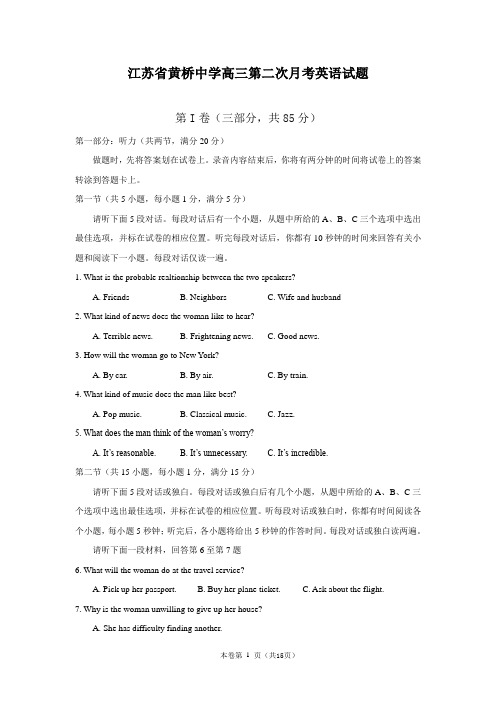
江苏省黄桥中学高三第二次月考英语试题第I卷(三部分,共85分)第一部分:听力(共两节,满分20分)做题时,先将答案划在试卷上。
录音内容结束后,你将有两分钟的时间将试卷上的答案转涂到答题卡上。
第一节(共5小题,每小题1分,满分5分)请听下面5段对话。
每段对话后有一个小题,从题中所给的A、B、C三个选项中选出最佳选项,并标在试卷的相应位置。
听完每段对话后,你都有10秒钟的时间来回答有关小题和阅读下一小题。
每段对话仅读一遍。
1. What is the probable realtionship between the two speakers?A. FriendsB. NeighborsC. Wife and husband2. What kind of news does the woman like to hear?A. Terrible news.B. Frightening news.C. Good news.3. How will the woman go to New York?A. By car.B. By air.C. By train.4. What kind of music does the man like best?A. Pop music.B. Classical music.C. Jazz.5. What does the man think of the woman’s worry?A. It’s reasonable.B. It’s unnecessary.C. It’s incredible.第二节(共15小题,每小题1分,满分15分)请听下面5段对话或独白。
每段对话或独白后有几个小题,从题中所给的A、B、C三个选项中选出最佳选项,并标在试卷的相应位置。
听每段对话或独白时,你都有时间阅读各个小题,每小题5秒钟;听完后,各小题将给出5秒钟的作答时间。
每段对话或独白读两遍。
江苏省黄桥中学2009年高考单选最后冲刺训练七(附答案详解)

2009年高考英语单选最后冲刺训练71. — You must be excited about going to Japan for schooling.—__________, but I'm afraid I can't do well because Japanese is poor.A. Never mindB. Well, I ought toC. I don’t know yetD. Certainly not2. —What do you think of your nephew?—He__________ be very naughty but at the same time you poor.A. will; willB.won't; can'tC. may; mayD. can; can't3. Exercise is__________ as any other to lose unwanted weight.A. so useful a wayB. as a useful wayC. as useful a wayD. such a useful way4. —____________ you_________ the editor at the airport?—No, he__________ away before my arrival.A. Have... met; has drivenB. Had... met; was drivenC. Did... meet; had been drivenD. Have... met; had driven5. —Why didn't you answer my phone when I phoned you at about 11 p. m. yesterday?—I ___________and failed to hear the phone.A. might have sleptB. must be sleepingC. might be sleepingD. must have been sleeping6. His parents meant him_____________ scientific research, but he showed no interest and turned poet.A. going in forB. to have gone in forC. to go in forD. having gone in for7. —What would you wish to do if you were a college student again?—That's very hard to say, but I wish I when I was a college student.A. has not studied biologyB. did study biologyC. had studied biologyD. studied biology8. He___________ when the bus came to a sudden stop.A. was almost hurtB. was to hurt himselfC. was hurt himselfD. was hurting himself9. ___________ with the size of the whole earth, the highest mountain doesn't seem high at all.A. When comparedB. To compareC. While comparingD. It compared10. If you want to see a doctor, fix the date with him ahead of time. This is a common ___________ in the USA.A. habitB. lawC. ruleD. custom11. Nothing__________ after the terrible fire which had been caused by someone smoking in bed.A. leftB. was remainedC. remainedD. continued12. Although motor car has been with us for almost a century, I have never been able to drive __________American one.A. the; anB. was remainedC. a; theD. the; the13. It was not a good idea to go skating. You __________your leg.A. can breakB. could breakC. could have brokenD. could have been broken14. —What were you doing when she dropped in?—I for a while and_________ some reading.A. was playing; was going to doB. played; didC. had played; was going to doD. had played; did15. The queen will visit the town in May, she will open the new hospital.A. whenB. thenC. whileD. but16. _________good, the food was soon sold out.A. TastedB. Being tastedC. TastingD. Having tasted17. I feel silly in these clothes. Everyone will___________ me.A. worry aboutB. make fun ofC. get rid ofD. take interest in18. —How did you find your visit to the museum, Jane?--_________.A. Oh, wonderful, indeedB. By taking a number 3 busC. I went there aloneD. A classmate of mine showed me the way19. Up to Tuesday's attack, the worst school shooting in the U. S. was in March 1998 in Jonesboro, two boys, aged 11 and 13, shot and killed a teacher and four girls.A. whileB. whereC. whenD. then20. When I tried to find _________that prevented so many people from taking part in the program, it seemed to me that there were two main reasons.A. why it didB. that it didC. what it wasD. why it was21. I tried hard to get some information about the new technology out of his mouth, but he remained____________.A. quietB. secretC. silentD. calm22. —Why! Where's my passport? Maybe I left it on the plane.--My Goodness! You ____________ things behind.A. had never leftB. didn't leaveC. never leftD. haven’t left23. — Show me your permit, please.—Oh, it's not in my pocket. ItA. might fall outB. could fall outC. should have fallen outD. must have fallen out24. —I'd like to have some lunch but I have to stay here doing my work.—___________ what you want and I can get it for you.A. To tell meB. Telling meC. If you tell meD. Tell me25. "Who Moved My Cheese?", ____________ is a best-selling book, is written by Spencer Johnson.A. whichB. thatC. itD. what26. —Our holiday cost a lot of money.—Did it? Well, that doesn't matter____________ you enjoyed yourselves.A. unlessB. in caseC. as far asD. as long as27. O'Neal works hard. He is often seen _______ heavily before his teammates have even arrived at practice.A. sweatedB. to be sweatedC. sweatingD. being sweated28. Travelers_______________ that they should bring their ID cards with them.A. have remindedB. are remindedC. were remindingD. had been reminded29. —Look at these tracks. It __________ be a wolf.—It needn't be. It ___________ be a fox.A. must; couldB. may; mightC. need; mustD. could; need30. I've visited a lot of different places and stayed in lots of different hotels, but none of them___________ this one.A. makesB. beatsC. comparesD. matches答案详解1.B本题关键是抓住答语中提供的信息,“恐怕我做不好,因为我的日语很差。
江苏省黄桥中学高三英语语法复习第四章情态动词

第四章情态动词情态动词表示说话人对动作或状态的各种观点和态度,如需要、猜测、意愿或怀疑等。
情态动词有词义,但不完全,是所谓的“辅助性”动词,在句中不能单独充当谓语。
一、情态动词的特征和形式B.情态动词除ought to, used to等外,后面只接不带to的不定式。
1.情态动词+doYou shouldn't be so careless. 你不该这样粗心大意。
Jessica told him yesterday she might not go on the trip.杰西卡昨天告诉他,她可能不去旅行了。
Difficulties can and must be overcome. 困难能够而且必须克服。
2.情态动词+be doingShe must be listening to pop music. 她肯定在听流行音乐。
You should be reviewing your lessons. 你应该在复习功课。
My mother maymight be cooking now. 我妈妈可能正在做饭。
3.情态动词+have doneThey might have visited the Great Wall. 他们可能参观过长城了。
He must have got up very early to catch the train. 他一定起得很早去赶火车了。
You ought to have come earlier. 你本该早一点儿来。
4.情态动词+be doneThis word can also be used as a verb. 这个词也可以用作动词。
Something must be done to stop pollution. 必须采取措施来制止污染。
The work ought to have been finished long ago. 这工作早就该完成了。
C. 情态动词第三人称单数一般现在时没有词形变化。
黄桥中学2008~2009年度高三第二次月考试卷及答案
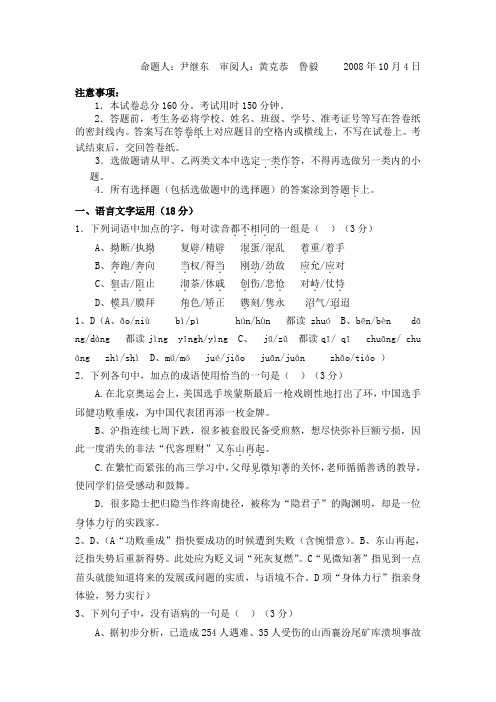
命题人:尹继东审阅人:黄克恭鲁毅 2008年10月4日注意事项:1.本试卷总分160分。
考试用时150分钟。
2.答题前,考生务必将学校、姓名、班级、学号、准考证号等写在答卷纸的密封线内。
答案写在答卷纸...上对应题目的空格内或横线上,不写在试卷上。
考试结束后,交回答卷纸。
3.选做题请从甲、乙两类文本中选定一类作答......,不得再选做另一类内的小题。
4.所有选择题(包括选做题中的选择题)的答案涂到答题卡...上。
一、语言文字运用(18分)1.下列词语中加点的字,每对读音都不相同....的一组是()(3分)A、拗.断/执拗.复辟./精辟.混.蛋/混.乱着.重/着.手B、奔.跑/奔.向当.权/得当.刚劲./劲.敌应.允/应.对C、狙.击/阻.止沏.茶/休戚.创.伤/悲怆.对峙./仗恃.D、模.具/膜拜角.色/矫.正镌.刻/隽.永沼.气/迢.迢1、D(A、ǎo/niù bì/pì hún/hùn 都读zhuó B、bēn/bèn dāng/dàng 都读jìng yīngh/yìng C、 jū/zǔ都读qī/ qī chuāng/ chu àng zhì/shì D、mú/mó jué/jiǎo juān/juàn zhǎo/tiáo )2.下列各句中,加点的成语使用恰当的一句是()(3分)A.在北京奥运会上,美国选手埃蒙斯最后一枪戏剧性地打出了环,中国选手邱健功败垂成....,为中国代表团再添一枚金牌。
B、沪指连续七周下跌,很多被套股民备受煎熬,想尽快弥补巨额亏损,因此一度消失的非法“代客理财”又东山再起....。
C.在繁忙而紧张的高三学习中,父母见微知著....的关怀,老师循循善诱的教导,使同学们倍受感动和鼓舞。
D.很多隐士把归隐当作终南捷径,被称为“隐君子”的陶渊明,却是一位身体力行....的实践家。
江苏省黄桥中学高三英语语法复习第七章动词的过去分词形式

第7章动词的过去分词形式动词的-ed形式也是非谓语动词的一种,它具有动词的一些特点,同时也具有形容词、副词的句法功能,在句中可用作表语、定语、状语和宾语补足语等。
一、动词的-ed形式的特征A.动词的-ed形式是由动词的过去分词构成动词的-ed形式只有一种形式,即传统语法中的过去分词。
绝大部分的动词的-ed形式由动词原形加-ed构成,也有一些动词的-ed形式是不规则的。
1.规则动词的-ed形式limit→limited(限制)pretend→pretended(假装)e scape→escaped(逃脱)provide→provided(提供)refer→referred(提交)drag→dragged(拖)pray→prayed(祈祷)supply→supplied(供应)2.不规则动词的-ed形式cast→cast(投掷)spread→spread(传播)bite→bitten(咬)forgive→forgiven(原谅)spit→spat(吐)wear→worn(穿)fight→foug ht(搏斗)lose→lost(丢失)3.少数动词的-ed形式作定语时,读音与一般过去分词不同learned a learned professor 一位知识渊博的教授aged an aged man 老人beloved his beloved computer 他心爱的计算机B.动词的-ed形式的否定形式动词的-ed形式的否定形式是由not或never加动词的-ed形式构成。
Not allowed to go in, he had to wait outside. 不允许他进去,他只好在外面等着。
Never invited to his party, she got angry with him. 从未被邀请过去他的聚会,她很生气。
C.动词的-ed形式的特征动词的-ed形式有被动的意思,有时也可表示完成的动作。
- 1、下载文档前请自行甄别文档内容的完整性,平台不提供额外的编辑、内容补充、找答案等附加服务。
- 2、"仅部分预览"的文档,不可在线预览部分如存在完整性等问题,可反馈申请退款(可完整预览的文档不适用该条件!)。
- 3、如文档侵犯您的权益,请联系客服反馈,我们会尽快为您处理(人工客服工作时间:9:00-18:30)。
江苏省黄桥中学2009届高三英语语法专题复习校本讲义冠词【要点点拨】一.不定冠词中的主要用法:1.表“一个”“每一个”(=per)“某一个”(=a certain / some),如: eight hours a day; a Mr. Smith2.a / an +抽象名词表示具体的人或物(如:a pleasure / success / failure/ comfort / shame等);a / an +某些物质名词表示“一阵” “一份”等,如: a heavy rain;3. a / an +有些名词= the same+ n. 如: The students standing there are of an age (= of the same age.)二.定冠词的主要用法:(一)1.特定的或上文提到的人或物(包括特指的不可数名词);2.一些习惯用语及固定词组中;(二)1.世界上独一无二的物,或表示方位及发明物前: the universe; the sun; the moon; He invented the wheel;2.乐器名词前: play the violin;3.表计量单位的名词前,表示”按……”: by the dozen / yard / hour;4.与形容词或分词连用表示某一类人或事(或某国家的人): the old / sick / Chinese;(三)1.用于姓的复数形式前表示夫妇两人或某一家人: the Browns2.年代的名词前表示”某十年代” : in the 1990s(四)1.在表示江河,海洋,山脉,群岛,海峡,海湾等名词前:the Yellow Sea; the English Channel; the Rocky Mountains;2.在由普通名词构成的表示机构、国家、建筑、历史朝代、三军、报刊,、杂志等名词前:the Song Dynasty ; the World Trade Center; the People’s Daily; the Times;(五)1.用在序数词及形容词最高级前(但:my first visit to the Great Wall) ;2.对两人/物间进行比较表示特定的一个时(the+比较级): He is the taller of the twins;3.句型”the+比较级……,the+比较级”中:The higher you stand, the farther you’ll see.三.不用冠词的场合:(一)1.抽象和物质名词前(除非表示特定时);2.星期,季节,月份的名词前(比较:in winter / in the winter of 2000 ; on Sunday / on a Sunday in May);3.三餐饭前(比较:have lunch / have a big lunch);4.球类或棋类名词前(play cards / chess);5.表示学科的名词前;6.by+交通工具的名词前(by car =in a car);7.表示节假日的名词前(但:the Mid-Autumn Festival或可说成Mid-Autumn Day);(二)1.在称呼语前及表示人的职位,头衔,身份的名词在句中作表语,补足语及同位语时(在as后也常省略);2.指家中雇佣的cook, nurse, teacher等时不用冠词并且大写:He was made monitor of our class; What’s the matter,Grandpa?(三)1.动词turn后的名词前不用冠词(但become后接可数名词单数时要加冠词): turn doctor=become a doctor;2.word表示“消息” “诺言”时不用冠词: leave word / keep one’s word / a man of his word;3.man表示“人类”时不用冠词;4.连词as(虽然)引导倒装句中的名词前不用冠词;(四)在一些表示街名,广场名,公园名,大学名,国名,人名等专有名词前:Nanjing Road; Tian An Men Square; Hyde Park (但:the People’s Park); Yal e University ( the University of Yale)(五)下列短语中有无冠词意义大不一样:at (the) table; in (the) prison; at (the) sea; by (the) sea ; by (the) hand; go to (the) hospital; on (the) earth; out of (the) question; by (the) day; i n (the) front of ; (the) three of us; the / a number of; have a word/ words with sb.; a singer and (a) dancer ; a knife and (a)fork ; a / the sec ond time ; a / the most beautiful city四.冠词的位置:1.all / both / half / many / double / such / what / quite+ 冠词+(形容词)+名词:half the books ; many a student ; such a fine day; What a lovely present! quite a big meal2.as / so / how / too+形容词+冠词+名词: so fine a day; too difficult a problem; as clever a boy as you【各个击破】1.-----Jack, there’s ______ Mrs. Smith o n ______phone for you.------I’m in the bath.A. a; theB. the; aC. a; /D. the;/2. Tell her not to stay in _____hotel next time she comes here. I can find _____bed for her in my flat. Now I’m sleepy and I want to head for _______ bed .A. the; / ; /B. a; / ; aC. the; a ; /D. the; a ; the3. After I left _______university, I turned _______ lawyer.A. an; aB. a; aC. / ; /D. the; the4. ------What about ______lecture this morning?------Oh, it was too difficult ________ lecture for me.A. the; theB. a; aC. a; theD. the; a5. The manager decided to put _____plan into ______ practice because he thought it was ______most practical one.A. the; the; aB. a; /; theC. the; / ; aD. a; the; the6. People of _______kind fall into ______same group and things of _____kind flock together.A. the; the; theB. a; the; aC. a; /; aD. the; a; the7. ------What do you usually have for_____ breakfast ?------Some milk and bread.-----What about Jim?------He never has ______breakfast, for he always gets up too late, but this morning he had quite ________big breakfast.A./ ; / ; /B. /; /; aC. the; the; aD. the; the; /8. He told me that it was _____pleasure to help others and he would do it with ______ pleasure.A. a; aB. /; /C. the; aD. a; /9. ------I have telephoned him for three times this morning, but it seems that he is still in _____hospital.-------Why not call him for _______fourth time? Maybe he’s back now. H e told me yesterday the doctor allowed him to come home this morni ng.A. /; aB. the; theC. a; aD. / ; the10.It’s often less expensive to buy goods in ______quantity, but you’d better examine _______ quality before buying them.A. /; theB. the; /C. a; theD. the; the11. Tim couldn’t remember the exact date of the earthquake, but he knew it was _____Sunday because everybody was at________ c hurch.A./; theB. a; theC. a; /D. the; /12. The price of ________ jewel is decided by the sort of ______material used.A. the; theB. the; /C. /; theD. /; /13. Apples are usually sold by ______weight and eggs are sometimes sold by ______dozen.A. the; theB. /; aC. /; theD. the; a14. ------I hear as many as 50 children were killed in the accident.------Yes, _____news came as _____ shock to me.A. the; theB. the; aC. /; /D. /; a15. -----Are you used to our food here?------More or less, but ______knife and _______fork is still a problem.A. the; theB. a; aC. the; /D. / ; /16. Karl Marx first discovered ______political theory known as _______communism.A. a; aB. the; theC. the; /D. a; /17. _____library building in our school was completed in _____May of 1998, not in_______April, 1997.A. A; / ; /B. The; the; /C. A; the; /D. The; / ; /18. ------What do you think of ______ president?-------I didn’t care for him at first, but after ______ time I got to like him.A. the; aB. / ; theC. the; theD. /; a19. ------ He sent ______word that you shall go to his office after class.------I know. And ______word has come that you are the next person he wants to see.A. / ; /B. the; /C. a; /D. a; the冠词:ACCDC BBDAA CBCBC CBABA。
